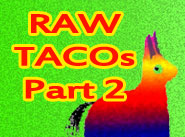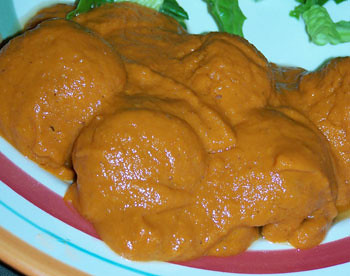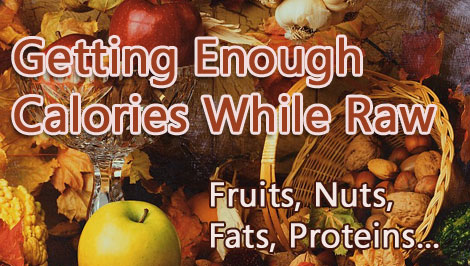
Q. I am trying to go raw and juicing for only two days now and I am soooo hungry and I really don't quite understand what to eat. I went out and bought a bunch of raw vegetables but I am lost on exactly how to prepare the meals and I'm so tired of being fat. Can you direct me to a simple start of book or can you give me some simple recipes or what you did to get started on your first month? Thank you.
Signed,
Frustrated and Fat in Virginia
A. Dear LOVELY BEING,
For the most part, I've been eating intuitively from the very start of my raw food journey (which began over two years ago!). I noticed that I was drawn to different foods for blocks of time, and as my interest would wane I'd find myself drawn to another raw food. Anyone who has followed my story to health knows about my love for young Thai coconuts. My entire body would vibrate with physical excitement every time I picked up another case of those life-enhancing baby coconuts. I felt like a child receiving a much-desired gift---giddy with excitement and unable to stand still. I'm not just saying that, either---it was a very strange sensation, feeling such excitement over a food.
Well, my love for the coconuts faded and I found myself drawn to other foods over the past few years. However, none of them ever compared in intensity to my desire for the coconut. I can't recall all of the foods I cycled through, but there were plenty of food cycles I went through. Currently, I'm intuitively drawn to the pineapple. I want to eat it at least once a day, sometimes more. I haven't tired of it in the least bit.


 Continuing with our Taco Week, here's a quick and easy (and delicious) salsa recipe. You can really have a lot of fun with salsa, and can get highly experimental if you like. Almost anything tastes great in salsa. This one is fairly basic, so feel free to spruce it up with some of your favorite ingredients. Let us know in the comments section some of your favorite variations so you may inspire others!
Continuing with our Taco Week, here's a quick and easy (and delicious) salsa recipe. You can really have a lot of fun with salsa, and can get highly experimental if you like. Almost anything tastes great in salsa. This one is fairly basic, so feel free to spruce it up with some of your favorite ingredients. Let us know in the comments section some of your favorite variations so you may inspire others!

Wow, who knew so much work goes into meeting up with people all across the country ! It's going to all be worth it, though, to meet so many of you!! Below are the definite meetups happening. There are more being planned that we'll share once things are finalized. If you don't see your town/city here, but it's on our list of places we'll be visiting, maybe you'd like to help us put together a little gathering If so, just let us know! We'll be updating later next week with a more finalized plan for the trip and various meetups taking place.
Read more: Meetups Across the Country: Want to Meet Wendi in Your Town/City?
The other day I made a recipe from "Rainbow Green, Live-Food Cuisine" by Dr. Gabriel Cousens. I modified his recipe a bit and what resulted was amazing. Perhaps the original recipe tasted even better, but this is what I did with it.


Jim here... Today Wendi is busy preparing for a multi-day activity that I'm sure she'll be writing about later this week. So, I thought I'd field a question we received recently (one directed specifically to me). We do receive a good deal of questions at our Raw Food Diet Question In-box (at Questions [at] PureJeevan.com), so feel free to send any in that you may have, and we'll definitely get to them all here in time. In any case, one reader writes:
As drawn as I am to a raw diet, being mostly cooked vegan right now, I can't help but come up against this each time: Since produce is, after all, mostly water, what did you eat while transitioning that didn't lead to shoving in lots of bread, potatoes, etc. Do you just eat lots and lots of, say, oranges, at one go? This has always been my raw downfall. I'm sure the answer is very simple.
Wow, this is a great question, and one with many possible answers! To begin, let's recognize that this isn't a question from a "SAD diet" eater. ?Being a vegan, alone, takes significant learning and (often) self-discipline to accomplish successfully. It's also, in my view, an excellent dietary and lifestyle choice for many people, regardless of whether they ever decide to try a raw foods diet. So, this question is rather advanced.

You know about raw foods, I know about raw foods, and we both know people who know about raw foods. It seems like more and more people know about this lifestyle than ever before -- and that's absolutely true! But, it's still true that, on the whole, the average person on the street knows almost nothing about it. As such, if you're a raw foodist, you often find yourself in situations in which you're explaining it to people. (Obviously, as raw foods bloggers, we're more than happy to do so, of course!)
Amid all of these explanations to new friends and new readers, it's not too uncommon to hear people scoff at the idea in one way or another. Common objections include things like:
On this page, we'd like to share some information about vegetable juicers. There are a number of different kinds, and we'll try to offer some background on many of the leading ones. We're affiliates for some, so if you're in the market for one of the ones we discuss, please follow the links we provide (or click the juicer pics) and you'll help support Pure Jeevan. But, either way, we certainly encourage you to consume fresh, delicious, nourishing veggie juices regularly!
The Jay Kordich Juicer -- The PowerGrind
 The PowerGrind Pro is a juicer put out by Jay Kordich, commonly known as the "father of juicing" by many in the raw food / living food world. In fact, our very first juicer was a "JuiceMan" model, purchased back in the early 1990s! But this is an entirely new machine, retooled from the ground up recently. At $289, it's a fairly high-end juicer (as compared with, say, department store models). However, it's certainly got the power and features to back up that level of investment. ?Head on over to the Jay Kordich web site for full details on the latest models.
The PowerGrind Pro is a juicer put out by Jay Kordich, commonly known as the "father of juicing" by many in the raw food / living food world. In fact, our very first juicer was a "JuiceMan" model, purchased back in the early 1990s! But this is an entirely new machine, retooled from the ground up recently. At $289, it's a fairly high-end juicer (as compared with, say, department store models). However, it's certainly got the power and features to back up that level of investment. ?Head on over to the Jay Kordich web site for full details on the latest models.
The Hurom Slow Juicer
 A year or two ago, when we still lived in Pittsburgh, we hosted the Monarch's (Matt & Angela) during one of their speaking tours. I remember Angela firing up their juicer in the morning and I thought (or possibly even said), "Wow, your juicer is broken!" I swore that something was wrong because it didn't sound like anything I'd heard before. But they then told us about what was then the newest juicer on the market -- the Hurom Slow juicer. It's garnered a lot of positive testimonials over the past few years, from quite a lot of juicing enthusiasts. While many of the features are nice, we imagine the the most important potential benefit would be the slower speed, which theoretically means less oxidation, less processing, and thus healthier juice. If we were in the market today, I've no doubt we'd try one of these, too (even at $359)! These juicers are available through our good friends at Natural Zing!
A year or two ago, when we still lived in Pittsburgh, we hosted the Monarch's (Matt & Angela) during one of their speaking tours. I remember Angela firing up their juicer in the morning and I thought (or possibly even said), "Wow, your juicer is broken!" I swore that something was wrong because it didn't sound like anything I'd heard before. But they then told us about what was then the newest juicer on the market -- the Hurom Slow juicer. It's garnered a lot of positive testimonials over the past few years, from quite a lot of juicing enthusiasts. While many of the features are nice, we imagine the the most important potential benefit would be the slower speed, which theoretically means less oxidation, less processing, and thus healthier juice. If we were in the market today, I've no doubt we'd try one of these, too (even at $359)! These juicers are available through our good friends at Natural Zing!
After leaving the windy area of Prescott Valley, AZ, Wendi and KDcat headed up to Sedona. Today is part one of their Sedona visit, focusing on their visit with raw chocolatier, Kelly Johnson. We'll pick up with Wendi's travelogue, where we last left off:
It was great driving to Sedona, since I have a fond place in my heart for this magical spot. I'll talk more about that later, though. When we arrived, went directly to a raw restaurant I remembered visiting a few years ago. The name had changed, and there was a lot more going on there.
KDcat and I placed an order for some food to go (we wanted to have a picnic, rather than be inside when there was so much beauty around), and then met the lovely Kelly Johnson. Kelly is one of the owners of the raw restaurant and he agreed to do a quick interview to tell us about the restaurant and what had changed since the last time I was in Sedona.
Well, here's my latest update on my nine days of mono meal eating. I have a headache this evening and I'm headed to bed early. I'm hoping the headache is a detox symptom and that it will be gone when I wake up.
April 9, 2008
One of our readers, Julie, asked me to update her on what kind of diet I'm doing and why I'm doing it. The last time I publicly made changes with my diet, I received many similar questions. So, I figured maybe it would be a good idea to respond to her question here on the blog for anyone else wondering the same thing.
I did explain, in a long post, about experimenting with my diet being important to me.If you didn't read that entry, it will answer a lot of your questions. For many of you, I think I know what you are thinking: "Wendi was pretty much morbidly obese, her health was horrible, but she's now healthy. Why would she change anything with her diet when she has already found what works "?
Well, it's true. I am extremely healthy compared to how I was before I started consuming raw foods. Here are some pictures to show the changes, to motivate some of you currently struggling with eating more raw foods...

